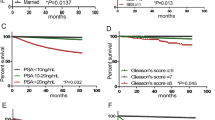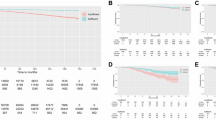Abstract
Several prognostic factors such as the extent of bone metastases (EOD) in advanced prostate cancer (PCa) have been reported. Metastasis of the lung is rarely a significant clinical factor in the management of prostate cancer. The present study evaluates the clinical significance of lung metastases. We retrospectively reviewed the PCa database to identify patients with pulmonary metastases at initial diagnosis. The medical records of the patients were examined with respect to age, histologic grade, EOD score, marker response to endocrine therapy and clinical outcome. We then compared several potential clinical factors between patients with and without pulmonary metastases. Next, we retrospectively reviewed autopsy records of 60 Japanese patients who died of hormone-refractory metastatic PCa with particular focus upon metastatic profiles. A comparative study of stage D2 patients with (n=20) and without (n=77) pulmonary metastases found no significant differences in EOD score, performance status, marker response and survival. Only tumor grade was better in the group with, than without pulmonary metastases (P=0.0120, chi-square analysis). In the series of autopsies, we found pulmonary metastases in 38 cases (63%), following metastases of the bone (57 cases, 95%) and lymph nodes (52 cases, 87%). A retrospective analysis of survival showed that patients with bone or lymph node metastases had a positive relative risk. In contrast, lung metastasis could be a positive prognostic indicator, although the findings were not statistically significant. These data suggest that the presence of pulmonary metastasis has no ominous impact on clinical course and disease outcome even in patients with disseminated prostate cancer.
This is a preview of subscription content, access via your institution
Access options
Subscribe to this journal
Receive 4 print issues and online access
$259.00 per year
only $64.75 per issue
Buy this article
- Purchase on Springer Link
- Instant access to full article PDF
Prices may be subject to local taxes which are calculated during checkout


Similar content being viewed by others
References
Kakizoe T . Figures on Cancer in Japan–1995 Foundation for Promotion of Cancer Research: Tokyo 1995 (in Japanese)
Rarker SL, Tong T, Bolden S, Wingo PA . Cancer Statistics CA Cancer J Clin 1997 47: 5–27
Huggins C, Hodges CV . Studies on prostate cancer, effects of castration, of estrogens and of androgen injection on serum phosphatase in metastatic carcinoma of the prostate Cancer Res 1941 1: 293–297
Resnick MI, Grayhack JT . Treatment of stage IV carcinoma of the prostate Urol Clin North Am 1978 5: 141–161
Ishikawa S, Soloway MS, Van der Zwaag R, Todd B . Prognostic factors in survival free of progression after androgen deprivation therapy for treatment of prostate cancer J Urol 1989 141: 1139–1142
Mulders PF et al. Analysis of prognostic factors in disseminated prostatic cancer. An update Cancer 1990 65: 2758–2761
Soloway MS . The importance of prognostic factors in advanced prostate cancer Cancer 1990 66: 1017–1021
Ernst DS, Hanson J, Venner PM . Uro-Oncology Group of Northern Alberta Analysis of prognostic factors in men with metastatic prostate cancer J Urol 1991 146: 372–376
Chodak GW et al. Independent prognostic factors in patients with metastatic (stage D2) prostate cancer JAMA 1991 265: 618–621
Matzkin H et al. Prognostic factors in stage D2 prostate cancer treated with a pure nonsteroidal antiandrogen Cancer 1993 72: 1286–1290
Matzkin H, Perito PE, Soloway MS . Prognostic factors in metastatic prostate cancer Cancer 1993 72: 3788–3792
Jorgensen T et al. Prognostic factors in patients with metastatic (stage D2) prostate cancer: experience from the Scandinavian prostatic cancer group study–2 J Urol 1997 158: 164–170
Imamoto T et al. Pretreatment serum level of testosterone as a prognostic factor in Japanese men with hormonally treated stage D2 prostate cancer Endocrine J 2001 48: 573–578
Isshiki S et al. Chromogranin A concentration as a serum marker to predict prognosis after endocrine therapy in prostate cancer J Urol 2002 167: 512–515
Akimoto S et al. Prognostic value of the serum levels of bone formation and bone resorption markers in prostate cancer patients with bone metastasis Eur Urol 1998 34: 142–147
Bubendorf L et al. Metastatic patterns of prostate cancer: an autopsy study of 1589 patients Hum Pathol 2000 31: 578–583
Viadana E, Bross IDJ, Pickren JW . The metastatic spread of kidney and prostate cancers in men Neoplasma 1976 3: 323–332
Saitoh H et al. Two different lymph node metastatic patterns of a prostatic cancer Cancer 1990 65: 1843–1846
Varkarakis MJ et al. Lung metastases in prostatic carcinoma, clinical significance Urology 1974 3: 447–452
Fabozzi SJ, Schellhammer PF, El-Mahdi AM . Pulmonary meta-stases from prostate cancer Cancer 1995 75: 2706–2709
Karnofsky DA . Determining the extent of the cancer and clinical planning for cure Cancer 1968 22: 730–734
Soloway MS et al. Stratification of patients with metastatic prostate cancer based on extent of disease on initial bone scan Cancer 1988 61: 195–202
Isaacs JT . The biology of hormone refractory prostate cancer. Why does it develop? Urol Clin North Am 1999 26: 263–273
Acknowledgements
This study was supported in part by the Ministry of Education, Science, Technology and Culture (11770882, 11671536 and 13671635), the Inohana Foundation (Chiba University), the Japanese Urological Association (2000), and the Japanese Society of Strategies for Cancer Treatment and Research (2001).
Author information
Authors and Affiliations
Corresponding author
Rights and permissions
About this article
Cite this article
Nakamachi, H., Suzuki, H., Akakura, K. et al. Clinical significance of pulmonary metastases in stage D2 prostate cancer patients. Prostate Cancer Prostatic Dis 5, 159–163 (2002). https://doi.org/10.1038/sj.pcan.4500573
Received:
Accepted:
Published:
Issue Date:
DOI: https://doi.org/10.1038/sj.pcan.4500573
Keywords
This article is cited by
-
68 Ga-PSMA-PET/CT for the evaluation of pulmonary metastases and opacities in patients with prostate cancer
Cancer Imaging (2018)
-
Simultaneous pulmonary metastases from colon and prostate cancer to the same lobe
Surgical Case Reports (2015)



